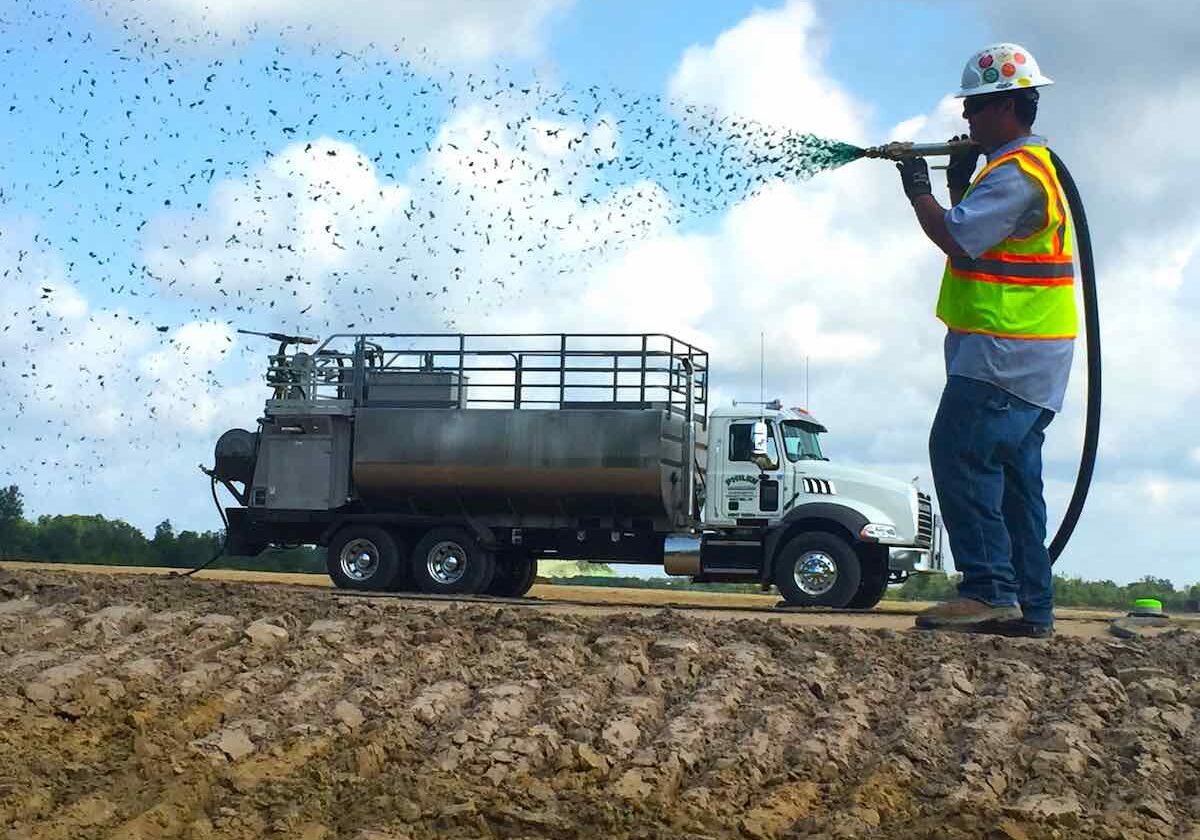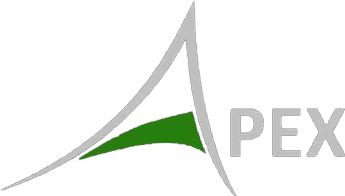Commercial Hydroseeding Costs

Share this article!
Like all forms of hydroseeding, the cost of commercial hydroseeding is impacted by a variety of factors. However, in 2021, the average range for commercial hydroseeding projects was from $3,000 to $5,000 per acre.
Depending on the type of equipment you use, the materials involved for the hydroseeding project, and the particulars of the location, landscape, and operations, commercial hydroseeding costs can fluctuate.
Hydroseeding Equipment Costs
The primary cost involved when considering commercial hydroseeding is the hydroseeder itself. Commercial hydroseeders come in a variety of sizes and capacities, each suited to a range of project sizes and terrains. Prices range from the low $10,000s into the upper $200,000s depending on the machine and capacity. For most large-scale projects, a mid-range commercial hydroseeder can be purchased for around $90,000 – $120,000.
Purchasing new versus used equipment can also affect how much you may need to effectively budget for your hydroseeder.
When to Rent a Hydroseeder vs. When to Buy a Hydroseeder
Renting a commercial hydroseeder can be a cost-effective method to complete many different landscaping projects. Like purchase pricing, the cost to rent hydroseeding equipment also varies according to the size and capacity, as well as location and the expected duration of the rental.
It’s important to consider the percentage of hydroseeding projects your business typically takes on — if these projects are taking up 15-20% of your billable projects, it may be worth investing in owning your own equipment. If hydroseeding is an infrequent project, renting may be a more cost-effective methods to get the results hydroseeding can offer.
Hydroseeding Materials Costs
Understanding the cost of hydroseeding materials is key to the overall estimated costs for commercial hydroseeding, as these can impact the bottom line significantly. We recommend researching each of the materials you’ll need to use for an average project to effectively budget costs for a project, or on-going projects.
The type of materials you choose will also impact how much you can expect to pay. For example, if you need resilient grass seed that can hold up under a lot of foot traffic, you may expect to pay a higher price for those seed varieties, similarly if you’re looking to provide a more ornamental or other sought-after grass seed types.
| Material | Average Cost Range |
| Seeds | $3 – $15 per pound |
| Mulch | $15 – 65 per yard |
| Fertilizer | $0.75 to $1.00 per pound |
| Tackifiers | $10 – $20 per pound |
| Herbicides | $8 – $45 per gallon |
In addition to the basic materials used in an average hydroseed slurry, some jobs may require additives like biostimulants (to help seeds establish), lime, or other specialty fertilizers to help facilitate the desired growth and results. These materials can add to the overall costs for commercial hydroseeding with averages like:
- Added herbicides like Acumen® or Ag Saver™:
- $17 – $80 per gallon
- Biostimulants like humic acid
- $20 – $30 per gallon
- Lime
- $12 – $18 per ton
Pricing Commercial Hydroseeding Jobs
The price you charge for commercial hydroseeding jobs is also crucial to establish the profitability and viability of projects. It’s important to consider regional prices for the typical combination of ingredients you’ll need, like mulch and grass seeds.
Locations and water accessibility can also significantly impact how much commercial hydroseeding jobs can cost. Additionally, considering the specific location and site conditions can help you plan ahead to cover any unexpected costs like soil preparation or irrigation that may be needed to ensure hydroseeding success.
Average Costs to Hydroseed Large Projects*
| Seeding Area Size | Estimated Costs | Potential Profit |
| 7500 sq. ft | $670 – $1,150 | $1,118 |
| 15,000 sq. ft | $975 – $1,645 | $2,235 |
| 30,000 sq. ft | $1,475 – $2,890 | $4,475 |
| 57,600 sq. ft (size a football field) | $2,986 – $5,500 | $8,583 |
*Prices are estimates and subject to regional pricing, availability, labor costs, material costs, and terrain specifics of the project in question.
Benefits of Hydroseeding for Commercial Projects
Because of its efficiency and effective, dependable results, hydroseeding can be a desirable investment for many commercial landscapers and contractors. Thanks to it’s quick-growing seed slurry and easy application process, hydroseeding is used for commercial projects from golf courses, athletic fields, and parks to roadsides, revegetation and reforestation efforts, and large residential lawns and business parks.
Efficiency
Hand seeding or broadcast seeding methods can be time consuming, and the results often leave a lot to be desired as both these methods can be dramatically impacted by environmental factors like wind, erosion, and over-drying. With hydroseeding, the slurry is applied with all the added nutrients and tackifiers necessary to both keep the seeds in place while they germinate, and help them germinate much faster than hand seeding. This also helps the seeds establish a thick, uniform turf. Hydroseeding can be done by a small team of individuals, and can cover large areas — up to 1,300 square feet in about an hour which is much faster than either hand seeding or laying sod.
Quick Germination and Robust Roots
Hydroseeding is known for its quick results. In the hydroseeding process, seeds, water, and fertilizers are all applied simultaneously. This lays the foundation for seeds to establish deep, robust root systems in a relatively short amount of time.
Hydroseeding also applies mulch, which helps to protect the seeds as they establish, leading to uniform coverage and great-looking results.
Water Retention
Many of the factors that make hydroseeding a great choice for quick germination and efficiency also contribute to added water retention. When the hydroseed slurry is applied, it’s typically mixed with water, tackifiers, and mulch. This combination of materials retains moisture, slowly releasing it into the soil as the seeds germinate, while stabilizing the area and holding slurry in place.
Erosion Control
These qualities all help make hydroseeding one of the most sought-after choices for erosion control. In areas where erosion and runoff are particular concerns, hydroseeding can help in several ways. Initially, applying hydroseed slurry helps retain moisture in the area thanks to absorbent materials like mulch, and chemical tackifiers which hold seeds against the soil, helping them germinate.
While seeds germinate, they establish expansive root systems, which help to stabilize soil, preventing runoff, erosion, and soil degradation. As plants grow, this process accelerates, as root systems expand and bind to soil, further stabilizing sloped areas and embankments.
High ROI
For an average 5,000 square foot hydroseeding project, the typical profit can be expected to range from a little over $100 to over $750. When factoring in hydroseeding expenses like materials and labor, this estimate can either increase or decrease depending on the quality of the materials and the specifics of the terrain involved.
ROI can also increase the more hydroseeding projects are completed, as teams get more familiar with the process and can move more quickly. Materials costs may also decrease when purchased in bulk, leading to further cost efficiencies and increased ROI.
Conclusion
With the many benefits offered by commercial hydroseeding, it’s easy to understand why contractors are increasingly finding success and adding operational efficiency with commercial hydroseeding. If you’re curious about the process, try renting a hydroseeder and testing yourself, or reach out to our team of experts with questions.
